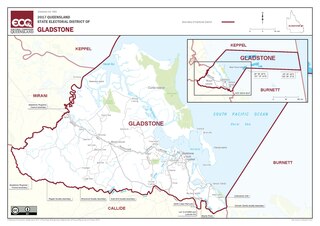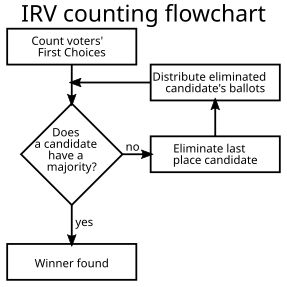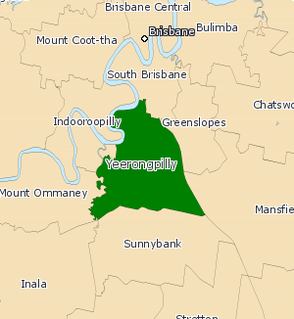
The Division of Kennedy is an Australian electoral division in the state of Queensland. The division was proclaimed in 1900, and was one of the original 65 divisions to be contested at the first federal election. It is named after Edmund Kennedy, an explorer in the area where the division is located in Queensland.

Gladstone is an electoral district of the Legislative Assembly in the Australian state of Queensland.
The following pendulum is known as the Mackerras Pendulum, invented by psephologist Malcolm Mackerras. Designed for the outcome of the 2007 federal election, the pendulum works by lining up all of the seats held in Parliament, 83 Labor, 55 Liberal, 10 National, and 2 independent, according to the percentage point margin on a two candidate preferred basis, as elected in 2007. The two candidate result is also known as the swing required for the seat to change hands. Given a uniform swing to the opposition or government parties in an election, the number of seats that change hands can be predicted. Swing is never uniform, but in practice variations of swing among the Australian states usually tend to cancel each other out. Seats are arranged in safeness categories according to the Australian Electoral Commission's classification of safeness. "Safe" seats require a swing of over 10 per cent to change, "fairly safe" seats require a swing of between 6 and 10 per cent, while "marginal" seats require a swing of less than 6 per cent.
Shane Andrew Knuth is an Australian politician. He has been a member of the Queensland Legislative Assembly since 2004, representing three successive seats: Charters Towers (2004–2009), Dalrymple (2009–2017) and Hill (2017–present). He has variously represented the National Party (2004–08), the Liberal National Party (2008–11) and Katter's Australian Party (2011–present).
The following pendulum is known as the Mackerras Pendulum, invented by psephologist Malcolm Mackerras. Designed for the outcome of the 2010 federal election, the pendulum works by lining up all of the seats held in Parliament, 72 Labor, 72 Coalition, 1 Nationals WA, 1 Green and 4 independent, according to the percentage point margin on a two candidate preferred basis. The two party result is also known as the swing required for the seat to change hands. Given a uniform swing to the opposition or government parties in an election, the number of seats that change hands can be predicted. Swing is never uniform, but in practice variations of swing among the Australian states usually tend to cancel each other out. Seats are arranged in safeness categories according to the Australian Electoral Commission's classification of safeness. "Safe" seats require a swing of over 10 per cent to change, "fairly safe" seats require a swing of between 6 and 10 per cent, while "marginal" seats require a swing of less than 6 per cent.

The 2012 Queensland state election was held on 24 March 2012 to elect all 89 members of the Legislative Assembly, a unicameral parliament.
Katter's Australian Party (KAP) is a political party in Australia. It was formed by the independent and former Nationals Member of Parliament for Kennedy, Bob Katter, with a registration application lodged to the Australian Electoral Commission in 2011. Katter has been the party's federal parliamentary leader since that time, while his son Robbie is the leader in Queensland.

The 2015 Queensland state election was held on 31 January 2015 to elect all 89 members of the unicameral Legislative Assembly of Queensland.
The following is a pendulum based on the outcome of the 2010 federal election and changes since, including the redistributions of seats in South Australia and Victoria. It is a Mackerras Pendulum, invented by psephologist Malcolm Mackerras, which works by lining up all of the seats held in Parliament according to the percentage point margin on a two-candidate-preferred basis. The two-party result is also known as the swing required for the seat to change hands. Given a uniform swing to the opposition or government parties in an election, the number of seats that change hands can be predicted. Swings are never uniform, but in practice variations of swing among the Australian states usually tend to cancel each other out. Seats are arranged in safeness categories according to the Australian Electoral Commission's (AEC) classification of safeness. "Safe" seats require a swing of over 10 per cent to change, "fairly safe" seats require a swing of between 6 and 10 per cent, while "marginal" seats require a swing of less than 6 per cent. The swings for South Australian and Victorian seats are notional, based on calculations by the AEC.

Robert Carl Ignatius Katter is an Australian politician. He serves as the member of the Legislative Assembly of Queensland for Traeger, having previously represented Mount Isa from 2012 to 2017. He is Queensland state leader of Katter's Australian Party.
The following is a Mackerras pendulum for the Queensland state election, 2012.
At the 2016 federal election of the 150 House of Representatives seats the Liberal/National Coalition won 76, a one-seat majority, Labor won 69 seats and crossbenchers won the remaining five. A redistribution in 2017/18 changed the representation entitlements. For the next election, the number of seats in the House will increase to 151, South Australia will lose a seat, Victoria and the Australian Capital Territory (ACT) will gain one seat each.
The following pendulum is known as the Mackerras Pendulum, invented by psephologist Malcolm Mackerras. Based upon the outcome of the 2007 federal election and changes before the 2010 election, the pendulum works by lining up all of the seats held in Parliament, 83 Labor, 55 Liberal, 9 National, and 3 independent, according to the percentage point margin on a two party preferred basis.
The Coalition won the 2013 federal election with 90 of 150 lower house seats on a current 17-seat, 3.65-point two-party swing, defeating the 6-year Labor government. Labor holds 55 seats while crossbenchers hold the remaining five. The Division of Fairfax was the last seat to be declared.

The 2017 Queensland state election was held on 25 November 2017 to elect all 93 members of the Legislative Assembly of Queensland, the unicameral Parliament of Queensland.
This is a Mackerras pendulum for the 2016 Australian federal election.
The Coalition won the 2016 federal election with a one-seat majority 76 of 150 lower house seats. Labor holds 69 seats while crossbenchers hold the remaining five.
The following is a Mackerras pendulum prior to the Queensland state election, 2017.

The 2020 Queensland state election is scheduled to be held on Saturday 31 October 2020 to elect the 57th Parliament of Queensland. All 93 seats in the Legislative Assembly of the unicameral parliament will be up for election. The two-term incumbent Labor government, currently led by Premier Annastacia Palaszczuk, will seek a third term against the Liberal National opposition, currently led by Opposition Leader Deb Frecklington.
The Labor party won the 2018 state election by winning 55 of the 88 lower house seats. The coalition won 27 seats while the Greens and independents won 3 each.






